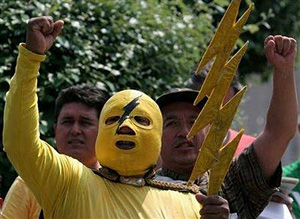 |
 |
 |
 Editorials | At Issue | July 2006 Editorials | At Issue | July 2006  
Mexican Vote Over, Not Campaign
 Laurence Iliff - Dallas Morning News Laurence Iliff - Dallas Morning News


| | Supporters of Party of the Democratic Revolution (PRD) presidential candidate Andres Manuel Lopez Obrador protest outside the Federal Electoral Tribunal in Mexico City July 29, 2006. (Reuters/Tomas Bravo) |
From the looks of it, Mexico's recent presidential election never happened.

Leftist leader Andres Manuel Lopez Obrador is calling on supporters to gather in the capital today for his biggest rally yet. Rival Felipe Calderon plans a tour of the nation. Supporters of both sport color-coded ribbons and exchange insults.

But the election is over, the people have voted, and the ballots have been counted, leaving a razor-thin lead for Calderon, a conservative. All that's missing is the final seal of approval from the Federal Electoral Tribunal.

And there's the rub.

Without an official winner, Mexico's presidential race is now at the height of what can only be called the post-campaign campaign, with Lopez Obrador screaming fraud at the top of his lungs in the hope of a tribunal-ordered recount, and Calderon warning of looming violence.

Analysts say the danger is rising day by day, as the tribunal takes its time poring over complaints of fraud and miscounted ballots, and Lopez Obrador ratchets up his rhetoric, most recently declaring himself "president of Mexico by the choice of the majority of Mexicans."

Lopez Obrador, of the center-left Party of the Democratic Revolution, or PRD, received 14.75 million votes out of more than 41 million cast in the five-way race. Calderon, from President Vicente Fox's ruling National Action Party, got 15 million.

Lopez Obrador, who claimed all year that he would win by 10 percentage points, "is challenging the system, pushing the government and establishment as far as he can," said Ana Maria Salazar, a Latin America security analyst and former Pentagon official. "How far? I don't think even he knows."

A month after the voting, Mexicans are more divided than ever as Lopez Obrador threatens acts of civil resistance that could close airports, highways and perhaps even Mexico-Texas border crossings. Last week, his followers protested inside a Wal-Mart and outside the Mexican stock market.

Today's rally is expected to draw hundreds of thousands of Lopez Obrador supporters, and the candidate is promising important announcements that could set the tone for coming weeks.

"Expect more radical measures, measures that will make life difficult for everyone," said PRD spokesman Gerardo Fern‡ndez Norona in an interview. "There will be a social crisis if there isn't a vote-for-vote recount."

The electoral tribunal has until Sept. 6 to declare a winner, with hearings scheduled as early as this week. Regional tribunals last week rejected charges of vote fraud and calls for a recount in several congressional races.

Calderon, saying he would not wait for the electoral tribunal's decision "sitting down," met Friday with subsistence farmers. "Mexico doesn't have time to wait," he said.

As bad as the noise and heat of the extra campaign innings, however, is the damage done to Mexico's new, internationally praised electoral system after decades of vote fraud, analysts said. And to its future president, whomever is declared the ultimate winner.

"The one who is losing the most here is Lopez Obrador along with this concept of the Mexican left," said Ricardo Alem‡n, a political columnist for the Mexico City newspaper El Universal. "But the Federal Electoral Institute is losing credibility also ... and Calderon, because there is an important part of the nation that questions the election."

In the post-campaign campaign, not unlike the 2000 race between George W. Bush and Al Gore, "we can't really talk about any winners," said Aleman.

The latest opinion poll, by the Mexican firm Ipsos-Bimsa, shows voters split on the election and its aftermath. Forty-eight percent of those surveyed said they wanted a total recount. Twenty-eight percent were against that measure, and 23 percent were "neutral."

But separately, 52 percent said they thought Calderon had won the presidential election. And about 60 percent thought the balloting was clean and electoral authorities were trustworthy. The poll's margin of error was plus-or-minus 3.5 percent.

Interviews with voters in Mexico City showed that campaign fatigue was setting in.

"Both sides have hit each other with everything they had, and it's the people of Mexico who have suffered as a result," said JosŽ Antonio çlvarez, 44, a financial consultant. "It's sad." | 
 | |
 |



